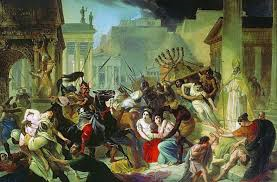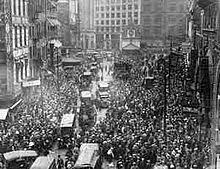
The end of a year (or in this case the end of a decade) always provides a reason to say how much things have changed – whether for better or worse – during the past twelve months. I will admit, things do indeed change but never as quickly or as fundamentally as we want to believe.
I’ve spent the past few days reading on-line commentary from an equal number of people who contend that 2019 was either the best of all times or the worse of all times. Those on the Left lament that during the decade of the 2010s we’ve gone from Obama’s “hope and change” to Trump’s despair. Others on the Right believe that, not only are we witnessing the strongest economy ever, but America’s best days are still ahead of us.
Storm Clouds and Rainbows. Frankly, I see both storm clouds and rainbows on the horizon. Opinion writers like Andrew Sullivan in New York Magazine (August 7, 2019) ask “Can the Country Come Back from Trump? The Republic Already Looks like Rome in Ruins.” On the other hand, even some of Trump’s most ardent critics acknowledge the US economy is unlikely to go into recession anytime soon and the world will probably see fewer wars in the 2020s than it did the past two decades. As Matt Ridley explained in an article published in the UK Spectator on December 21, 2019, by just about every measure, things have gotten better worldwide – with or without Donald Trump – during the past ten years.
The Fall of Rome Revisited. The best part of drawing analogies between modern America and ancient Rome is the target-rich environment it provides pundits. With over 200 reasons for the Roman Empire’s collapse, people of all political stripes can find whatever they need to prove their point. Nevertheless, in order to confirm what I remembered about Rome’s last days, I went back and reviewed my tattered copy of Edward Gibbon’s voluminous History of the Decline and Fall of the Roman Empire.
Here’s an abbreviated list of what I discovered. In no particular order, the Roman Empire fell because of political corruption, cronyism, moral decline, over-extended military, government over-spending, class warfare, destruction of the middle class, infrastructure decay, rising death rate, falling birth rate, climate change (caused by volcanoes), homelessness, unchecked immigration, Barbarian invasions, decline of educational institutions and libraries, and centralization of government functions. I could go on, but you get the point.
As British author Glubb Pasha pointed out in his seminal work “The Fate of Empires and Search for Survival” (1978), all great powers go through seven stages before they disappear: 1) pioneer, 2) conquest, 3) commerce, 4) affluence, 5) intellectual, 6) decadence, and 7) decline/collapse. Based on that continuum, where should the United States of America be placed?
The one cause of Rome’s decline I expected to find but didn’t was “lawlessness”. I suppose great societies are able to maintain the semblance of law and order up until their very end – just before they collapse into anarchy.
That said, I find many Progressive ideas extremely frightening. “Justice Initiatives” like abolishing all police departments, ending incarceration for all but the most heinous crimes, prohibiting schools from suspending students for disobedience, and using the National Guard to confiscate unregistered guns are just a few of the proposals that seem to me like end-stage symptoms of a society about to collapse.

The Boston Police Strike of 1919. The last time we officially tried anarchy in the US was during Calvin Coolidge’s tenure as governor of the Commonwealth of Massachusetts. 2019 marks the 100th anniversary of the Boston Police Strike in which a stone-throwing mob of 15,000 people descended on downtown Boston, roaming mobs robbed bystanders and looted stores, and a part-time infantry from rural Massachusetts fixed bayonets against the urban rioters, resulting in eight deaths over four tumultuous days. “When the City Was Lawless: Recalling the Boston Police Strike of 1919”, Boston Globe, September 7, 2019.
Not surprisingly, even to this day, union leaders claim that the strikers were only doing what they thought was right. However, back when the New York Times was still the “Paper of Record”, its editors called the strike “an essay in Bolshevism” and then-President Woodrow Wilson branded the walkout “a crime against civilization”. I have to wonder whether the Times and a Democratic president would do the same today.

Best or worst is subjective, just like luck. Storm clouds and rainbows are doomed to the same, as are most objects or utterances of any kind, from anyone or anything. It’s all subjective. Who and how something is perceived is more powerful, has more control, than object or idea being perceived. It’s the receiver, the perceiver, with the most control in any situation.
Everyone always does what’s right – based on their experience, knowledge, intelligence, and wisdom they make the choice. Who in their right mind would say… I’m going to pick the bad option, do the wrong thing, make the wrong choice? Every answer we need is already available, but we need the experience, knowledge, intelligence and wisdom to recognize it. Of course that’s subjective, too.
Orwell wrote about fact blurring, thought police and doublespeak as we see today. It’s an exciting time to be alive, but every moment in history has its own special excitement… it’s all subjective.
Do you mind if I quote a couple of your articles as long as I provide
credit and sources back to your weblog? My website is in the very same niche as yours and my users would really benefit from some of the information you
present here. Please let me know if this okay with you.
Many thanks!
Yes, that’s okay with me.